Category: politics
You are viewing all posts from this category, beginning with the most recent.
Positive Politics: Education
None of the topics I’ve teed up for my Positive Politics discussions are easy ones, but in the interests of easing into things I’ll try to take one that’s maybe not super-controversial to start. (Of course, as with anything political, I may be surprised by what becomes controversial.) So let’s talk about education. For my own organizational purposes, I’m going to break this down into three pieces: early childhood, K-12, and college.
My Background
My background is probably relevant here. After attending two different public schools for kindergarten, I was homeschooled as a child from grades 1 - 12. My maternal grandmother spent her entire career as an elementary school teacher. My parents, after some years as public educators, blazed the homeschooling trail when it was not quite and just barely legal. Thanks in large part to their efforts I did well on the college admissions tests, was named a National Merit Scholar, and graduated with an engineering degree from a private university. My wife and I are now on year 8 of homeschooling our three children, which we anticipate continuing with them through their high school years.
Early Childhood Education
Gone are the days when we could expect that preschool-age children would be cared for by a parent at home. Our modern society is nearly based on the assumption that even if both parents are present in the home - that itself a less frequent condition than it used to be - that both parents are working outside the home to make ends meet. For those with means, children may be left in educational day-care facilities and preschools, but poorer children may more usually get left in a less beneficial environment. Research shows us that these early years are critical to a child’s intellectual and emotional formation.
So what should we do? I suggest that the government should fund early childhood education opportunities. These need not be mandatory - parents should be welcome to choose their own option such as a stay-at-home parent, family member, or private setting - but it should be available for those who would need and use it. Yes, these programs would cost money, but as an investment in the good of those individual children and in society as a whole, they would be a wise choice.
K-12 Education
When compared with the benefit they provide society, I believe teachers are one of the most underpaid groups of workers in America. We require advanced college degrees, often expect that to a great extent the teachers will self-supply their classrooms, and then pay them a barely middle-class salary. I guess then I shouldn’t be surprised - just appreciative - when I see so many teachers with such strong altruistic desire to teach. Why else would they do it?
I suggest that we should significantly increase our commitment to public education, while allowing alternative options with appropriate safeguards in place. We should pay teachers at a rate more commensurate with other professional career paths and should fund associated school programs similarly. While I think local control and direction of the school system is important, schools should be funded from a broader pool - say, at the state level rather than the municipal level - so that we don’t forever build bigger and bigger rich suburban schools while having no funding available for poor districts.
Alternative options such as home schools and private schools should be allowed, but I’m skeptical of the case for routing funds to those schools via things like voucher programs. While on the face of the argument, vouchers seem like a reasonable idea - pay for results, regardless of where the results come from - the metrics make it very tricky. The example of the No Child Left Behind Act over the past 15 years should be enough for us to seriously consider whether we really want to couple educational funding to test-based outcomes. Should assessment tests be a part of an overall institutional evaluation? You bet. But funding contingent on those specific outcomes is problematic. Metrics are tricky things - design the wrong one and you get the wrong behavior.
College education
There’s probably a whole separate post to be written on this topic, but I’ll try to restrain myself. I see two primary problems with our higher education system at present: first, that the costs are increasing exponentially, resulting in college graduates with huge piles of debt; second, that a college diploma is considered nearly a de facto requirement for most jobs.
My grades and test scores helped when I went to college in the mid-90’s. I passed up several full-ride scholarship offers at public universities to attend a private school that offered more minimal scholarships. After graduating in four years, I still had enough college debt that I was writing significant checks every month for 10 years to pay it off. Now 20 years later, the College Board reports that, even adjusted for inflation, public school tuition and fees have more than doubled since I was in college. I’ll guarantee you that inflation-adjusted salaries for parents and students haven’t doubled accordingly! The result: even more debt for students and parents.
Unemployment rates make the story clear: for college graduates, the unemployment rate is nearly zero. (2.5% in January 2017, which is in practice full employment.) For high school graduates, unemployment is more than twice that - 5.3% - and for high-school dropouts, the unemployment rate nears 8%. So the most job opportunities would seem to be available for those who have a four-year diploma. But need this really be the case? Sure, in some disciplines a significant professional education is a must. (I’d like the guy designing my bridge or the woman operating on my heart to have the best education they can get!) But many blue collar and even white collar job fields shouldn’t require four or five years and a mound of debt just to buy entry to the field. Vocational training programs should be developed and encouraged for job areas that can reasonably be done without a four-year degree.
Evaluation
So let’s evaluate these against our five-principle framework.
1. Is it good for the poor?
Increased funding for the education system, with funding spread more broadly, should work to help improve education for the poor.
2. Is it good for the planet?
I’m not sure that the education system has a direct ecological impact - other than that ecological education could be part of a well-balanced system.
3. Does it promote peace?
Similar answer as to #2, though I would add here that education practices that lead to more diversity in our school populations should in the long term encourage more tolerance among diverse groups, which should promote peace.
4. Does it challenge the powerful? 5. Does it let the marginalized have a seat at the table to speak for themselves?
I’m not sure what all powerful groups need to be challenged in this area, but I would hope that the combination of more broad-pool funding combined with local control would help restrain more impersonal national forces in favor of more accessible local ones, and would empower even those in poor districts to make decisions that are beneficial for their children and communities.
--
[As a reminder: while this blog post is cross-posted to Facebook, I’m on a social media fast through the end of 2017, which means if you comment there I won’t see it. If you want to interact, comment here on the blog!]
Andrew Sullivan on the Gay Wedding Cake Case
I miss Andrew Sullivan. I’m glad the guy detached a bit - the pace of his daily blogging was incredible, no surprise it wasn’t sustainable - but he has a unique and important voice on issues of our time. So it was no surprise to me that his weekly column addressing the Gay Wedding Cake case is a must read.
I find myself pretty much in alignment with Andrew’s conflicted take. I’d highly recommend reading the whole thing - it’s not too long - but I’ll quote just one pithy paragraph.
In other words, if the liberals were more liberal, and the Christians more Christian, this case would never have existed. It tells you a great deal about the decadence of our culture that it does.
-- New York Magazine: The Case for the Baker in the Gay-Wedding Culture War
Positive politics: a little bit of foundation
Before I start in on specific political topics, I want to lay out some foundation that will lie under the specifics.
First, I’m a Christian, so my approach is necessarily rooted in Christian values and a belief that the Bible gives us God’s direction for what is best for human flourishing.
Second, the Bible provides very little direct instruction on what a government should look like other than some basics like punishing evil, encouraging good, being righteous and just. There has been a lot of teaching and assumption in the American evangelical church over the past 40 years that “Christian values” are closely aligned with Republican party positions. I’m going to challenge that assumption while hopefully not irrationally rebelling against it.
Third, politics is the art of the possible, and inherent in good politics is compromise. If all stakeholders are a little bit happy and a little bit unhappy with an outcome, it’s probably a good result from a political viewpoint.
Fourth, I believe that tolerance and freedom are values that should be promoted in our society. While I am a Christian, I do not believe that the best government would promote the Christian faith over other faiths. This includes not compelling uniquely Christian rules or practices simply because they are Christian. The government should foster a society that encourages the flourishing of all its members, regardless of their faith.
Finally, while I would hope the evaluation framework I’m borrowing from Brian Zahnd (as amended by my friend Misty Granade) is rather self-evidently good, I’d like to briefly outline my justification for each principle.
1. Is it good for the poor?
God cares deeply for the plight of the poor, as is demonstrated across the full sweep of Scripture. Old Testament laws command farmers to leave food on the edges of their field for the poor to glean and define jubilees that revert bought/sold property wealth. The New Testament gives instruction to provide for the poor and examples of offerings being taken up for them. This one seems pretty clear.
2. Is it good for the planet?
God is the creator. The earth displays His handiwork. Man’s first task is to care for the garden in which he was placed. God’s ultimate plan is for restoration of all things, including creation. In the same way the government should promote human flourishing, it should also promote the flourishing of all creation.
3. Does it promote peace?
I’m going to hope this one is self-evident. While peace is not always possible, it is always the goal.
4. Does it challenge the powerful? 5. Does it let the marginalized have a seat at the table to speak for themselves?
These two are closely related. It’s a given that there will always be power imbalances, and this isn’t inherently wrong or unreasonable. But power corrupts. Look at any government and you’ll see too many in power who are using that power not as good stewards promoting general flourishing but instead as selfish stewards out for their own gain.
James Madison summed it up brilliantly in Federalist #51:
If men were angels, no government would be necessary. If angels were to govern men, neither external nor internal controls on government would be necessary. In framing a government which is to be administered by men over men, the great difficulty lies in this: you must first enable the government to control the governed; and in the next place oblige it to control itself.
As such, having systems designed to challenge the powerful and let the marginalized have a voice are good because they put an elements of self-regulation into the system.
Onward!
With that set of background and caveats in place, I think it’s time to start writing on specific topics.
Thinking in more positive terms about political issues
 From time to time over the past year when I’ve been tempted to write political rage posts, it has seemed to me that even though they’d be cathartic, that wouldn’t be all that constructive. And while I haven’t studied political theory or public policy much, writing helps me work through my thinking on issues. So, my thought goes, maybe I should spend some time thinking through and writing constructive opinions on various political topics.
From time to time over the past year when I’ve been tempted to write political rage posts, it has seemed to me that even though they’d be cathartic, that wouldn’t be all that constructive. And while I haven’t studied political theory or public policy much, writing helps me work through my thinking on issues. So, my thought goes, maybe I should spend some time thinking through and writing constructive opinions on various political topics.
Then I came across this tweet from Brian Zahnd (this was before my social media fast, honest!) that seems like a good framework to work from:
Off the top of my head, some topics I’d like to consider:
- Taxation
- Religious Liberty
- Health Care
- Gun control
- Foreign trade policy
- Foreign military presence
- Middle East policy / terrorism
- Racial justice issues
- Social programs / social safety net
- Education
- Internet / technology policy
- Campaign finance
- Term limits
- Science & space
- Environmental issues
I’m not working through this all to get Brian Zahnd’s vote - I’d need to run for office first! But it might be constructive to think positively about what policy should be instead of just saying “well, that’s a bad idea”.
Some Thoughts on Thoughts and Prayers
The familiarity of yesterday’s breaking news alerts almost muted the shock. Half a church dead, the other half wounded. I’m old enough to remember the Luby’s shooting, which at the time was nearly unimaginable. And we can name the shootings that followed in the next 25 years in a horrific litany: Columbine. Sandy Hook Elementary. Virginia Tech. San Bernardino. Mother Emanuel Church in Charleston. The Pulse nightclub in Orlando. Las Vegas. And now, hardly before the crime tape was down in Vegas: First Baptist Church of Sutherland Springs.
The online response comes in three stages and is by this point, sadly, completely predictable:
Stage 1: Thoughts and Prayers House Speaker Paul Ryan called for prayers.

Same from Texas Governor Greg Abbott. And from Senate Majority Leader McConnell. And from the chairman of the Senate Homeland Security committee. And on and on and on.
Stage 2: The Backlash These range from the political from Senator Elizabeth Warren:

to the full on blast furnace from Wil Wheaton,
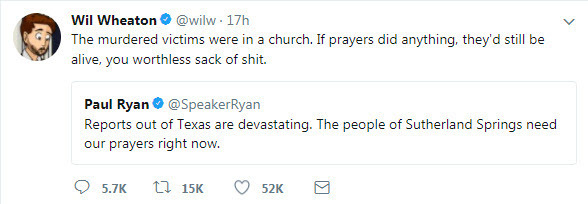
(who later tempered his remarks just a bit.)
Stage 3: The Persecution Complex
Christians, offended by the anger against the expression of prayers, start feeling put upon. Such as this example from First Things editor Matthew Schmitz:

And so it goes, back and forth, until the shooting passes from the news cycle either by natural decay or by the violence of yet another tragedy.
I have sympathies on both sides of this one.
I’m a Christian. God tells us to pray. I believe that prayer is effective. I’ve seen it work. Sometimes we pray and God works in direct, miraculous ways. But other times (and in my own limited experience, the majority of the time) we pray, and God works through someone else. Sometimes God even uses us to work out the answer to our own prayers. So I want to be sympathetic with the prayers of Christian political leaders. They go up with my own.
But I’m also sympathetic with the ragers. Wil Wheaton is no Christian. I don’t expect him to believe that prayer is effective. I think he’s angry with Christians like Paul Ryan not because they’re praying, but because they don’t seem to be doing anything else.
I don’t think legislation is the 100% solution to gun violence, but Republican leaders could push for real changes that would help things. To proclaim that you’re praying but then not do whatever else is within your power to address the issue is hypocrisy. And that’s reason enough to anger believers and unbelievers alike.
And to those who immediately start feeling hurt that people are criticizing the church? Maybe it’s time to take a hard look in the mirror. Maybe we deserve that criticism. Maybe we should provide them examples of Christians who are praying and also acting.
As I am finishing up this post, Tyler Huckabee has a twitter thread that captures this a lot more pithily than I have. Here’s how he brings it home:
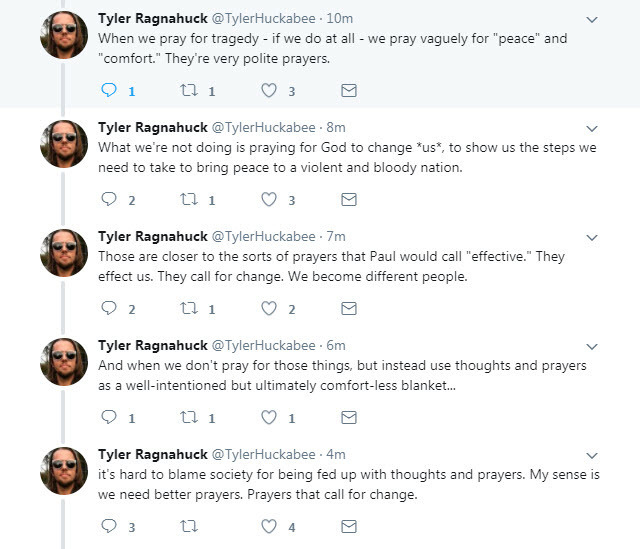
That’ll preach.
Liberty and Holiness
In a Facebook discussion recently on a mildly contentious topic, a friend brought out a line of argument that has me ruminating. Here’s what he said:
I think there is a lot to be said for the liberty we Christians have to partake of things, but there are certainly things the world has devised that are inherently unpleasing to God in any form. The question is - are we certain enough - do we have enough firm evidence that these [disputable] practices discussed above are absolutely not going to offend God that we can participate in them with a clean conscience? I know this - I have been bought with a very high price - the blood of Christ, and all too often, I do not reflect that in my conduct, but I should. I hope that we all are moved by that high price to think not of how far out to the boundaries of God’s permission we can roam in our conduct, but how near to Christ we can get.
This is a familiar argument in many ways. (How many times have I heard this as the preferred answer to lusting teens asking “how far is too far?”!) And indeed, it seems almost foolhardy to try to argue against the “how near to Christ can you get?” position. But on this question of liberty and holiness I think we could frame things up a little differently.
First, liberty and holiness are not two ends of the same spectrum. Here we need to distinguish between liberty in permissible things and freedom to sin. Freedom to sin using the excuse of abundant grace is clearly out of bounds (Romans 6:1). But liberty in matters of conscience is something different. When Paul instructs the Corinthians about meat sacrificed to idols, there is no suggestion that meat is OK, but not eating meat is more holy. There is holiness in exercising liberty.
Second, all good things come from God. “Every good gift and every perfect gift is from above, coming down from the Father of lights…” (James 1:17). Paul tells us that “God… richly provides us with everything for our enjoyment” (1 Timothy 6:17). God has not called us to be dour ascetics. Rather, he has called us to explore and enjoy His goodness to us in His creation. Which leads me to my last thought.
While I can hardly criticize a desire for holiness, at times I wonder if people may stress this desire to hide an underlying sense of fear or unease: fear of God moving in unexplained ways, fear of the Holy Spirit speaking unexpectedly, fear of seeing things that look like God working outside of the careful boundaries we’ve come to expect He should work in. And while we need to be ever sensitive to the Spirit’s leading when some particular idea or practice might be truly too far, we can do ourselves a disservice if we approach each experience or opportunity with suspicion instead of expectation. If, for example, the steak from the pagan butcher or the unfamiliar lectio divina is partaken with a prayer of expectation and a request for God’s blessing, why should we fear it?
“Which of you fathers, if your son asks for a fish, will give him a snake instead? Or if he asks for an egg, will give him a scorpion? If you then, though you are evil, know how to give good gifts to your children, how much more will your Father in heaven give the Holy Spirit to those who ask him!” (Luke 11:11-13)
My friend’s argument in questionable areas, if I can paraphrase, seems to be that “the default answer should be ’no’ unless you’re really, really sure that it can be ‘yes’”. What I’d like to advocate for, though, is to turn that around; that we can, without fear, start with a default answer of ‘yes’, trusting that the Holy Spirit will make clear when the answer should instead be ’no’.
15-year-old Chris would be in disbelief
File this under “things that would’ve stunned the 15-year-old Chris”.
As a teenager, the evangelical Christian culture we were in lionized people like Jay Sekulow. He founded the American Center for Law and Justice (ACLJ), which was out there fighting against the secular world to protect Christians’ rights. He argued and won a 9-0 Supreme Court decision that guaranteed Jews for Jesus could distribute evangelistic pamphlets at Los Angeles International Airport. A sterling example for Christian young people to look up to.

At the same time, the American Civil Liberties Union (ACLU) was spoken of with disgust. Anti-Christian. There to take away our religious liberty. Thank God we have people like Jay Sekulow to fight them on our behalf.
Fast-forward 25 years.
We now have a President who has been described by Jerry Fallwell Jr. as “evangelicals’ dream president”. In that president’s flurry of anti-immigrant activity, Immigration and Customs Enforcement is now looking to deport more than 100 Iraqi Christians, most of whom have been in the country legally for many years, and send them back to Iraq where they are a heavily persecuted minority.
Wait, what? Christians immigrants being deported? Where are the religious liberty groups like the ACLJ and our brave heroes like Jay Sekulow?
Oh, that’s right: Sekulow is currently a part of the President’s legal team and is making the rounds of the Sunday news talk shows arguing with TV hosts about why the President’s tweets saying “I am under investigation” don’t really mean that he’s under investigation.
And who is standing up for the Iraqi Christians?
Yes, I know all the objections that will come back to this. Not all evangelicals. Franklin Graham actually broke with the President on this one. Some of the deportees have criminal records. The ACLU supports some causes I disapprove of. Etc, etc.
But really, this is such a stunning reversal of positions (or at least, my perception of those positions) over the past couple decades that it’s enough to set my head spinning. It also makes me happy to have set up a recurring monthly donation to the ACLU.
“He has shown you, O mortal, what is good. And what does the Lord require of you? To act justly and to love mercy and to walk humbly with your God.” - Micah 6:8, NIV
Where you get your news matters
As I sit and write today we are in day two of Donald Trump’s presidency. Across the United States and around the world, hundreds of thousands of people are marching in protest of Trump’s disregard for women and minorities. It’s likely that the number of attendees at the marches in Washington, DC, will far outnumber the crowds at Trump’s inauguration yesterday.
I’ve seen a broad number of first-hand reports from those marches all morning via Twitter. What astonished me, though, was seeing the broad difference in coverage between various online news sources. Here’s what I found. I screen captured these websites around 11:30 AM central time.
ABC News
ABC’s top story is the march, with a photo. It’s followed by headlines about President Trump’s visit to the National Cathedral, a tornado in Missisippi, and an avalanche in Italy. A fair spread of news for the first screen.

BBC News
Again the lead is the marches, with special note taken that there are protests around the world, not just in DC. They quickly link to analysis pieces. “Why are the women marching?” “Trump’s angry call to arms.” And who can resist the delicious headline “Democrats flail in abyss”?
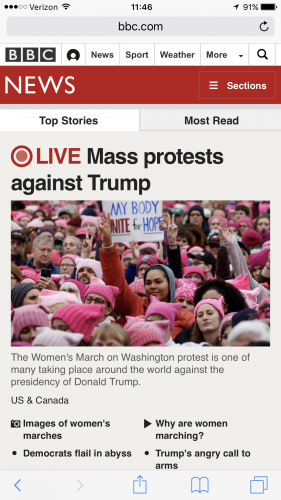
NPR News
NPR leads with the themes of President Trump’s inaugural message: “American carnage” and “America First”. Second comes the marches.
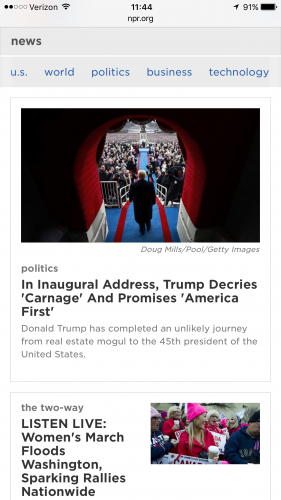
CNN
CNN is all about the marches on the first screen, including live video coverage and individual stories apparently profiling marchers. Just below the digital fold is a section titled “The Start of the Trump Era”.
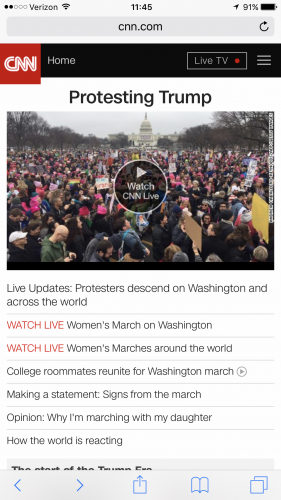
Fox News
Then there’s Fox News. Screen one: Trump signs an executive order to try to gut the Affordable Care Act. Trump’s “new vision” for America. I was curious, so I kept scrolling.
Screen two: Obama’s flight to a vacation diverted due to bad weather. Full text of Trump’s inauguration speech. Other news sites deem Trump’s speech offensive. Trump has to part with “beloved cellphone”. Trump attends prayer service. “Three Things Every Christian Owes Donald Trump”. (Well, OK, then.)
Let’s keep going.
Screen three: “Food Network Star implies Trump plagiarized Inauguration Cake”. (Take a look at the side-by-side pictures. Totally plagiarized. But I digress.) And there it is! Finally! One line! “Hundreds of thousands of women march on Washington”. No photo. But a big photo of tornado damage in Mississippi and one of a bust of Winston Churchill that Trump has returned to the Oval Office.

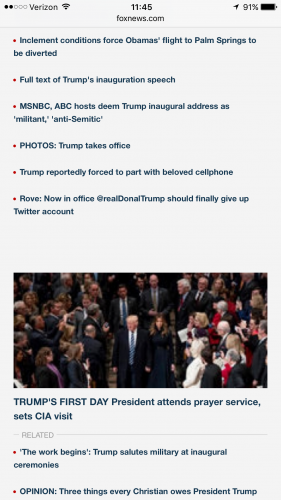
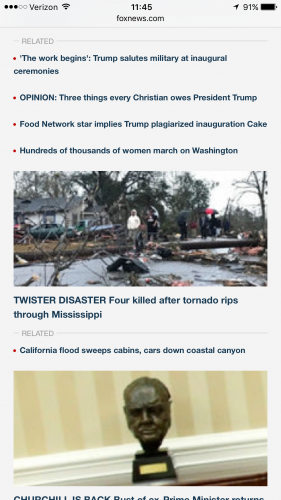
Now friends, the disparity in coverage is, I hope, so obvious that I don’t even really need to point it out. What this highlights, though is that how and where we get our news matters.
Every reporter and news organization has some sort of bias. We will never find a source that is completely neutral. There have been Washington marches in the past (e.g. the Right-to-Life march every year) that CNN will ignore and Fox News will headline.
What we can learn to do, though, is to read widely and to become aware of those biases. If your only source for news is Fox, I beg you, watch some CNN as well. Or read the New York Times. If your only source is MSNBC or NPR, read some Fox for balance.
Facts are facts, but perspectives are tricky things. For us to navigate the upcoming years as people of good will we must work diligently to learn the facts, and to recognize perspective and bias in ourselves and those around us.
The most moving video I've seen in quite a while...
President Obama awards VP Joe Biden the Presidential Medal of Freedom in recognition of his 40 years of public service. Biden has no idea the award is coming. Agree with their politics or not, these are respectable men who have each served their country well.
The friendship and love they have for each other is remarkable and touching. It’s hard not to contrast Biden’s evident humility with the arrogant bluster we so often hear from the next resident of the White House.
www.youtube.com/watch_GKoF0
Thanks, Obama.
A little more than 8 years ago I did something I’d never done before, and voted for a Democrat for president. For a born-and-raised Republican, this was a big step. But there was something about this man that was special. He talked in an inspiring way about hope that we hadn’t heard from politicians in quite a while. And there was something special about electing America’s first black president.
I remember sitting at home watching President-Elect Obama give an acceptance speech before a massive crowd at Grant Park in Chicago. It seemed like a turning point of sorts, a reason to be hopeful about our political situation.
Now by any measure there are gripes each of us would have with the policies and decisions President Obama has made over the past 8 years. Politics is the art of the compromise. If everyone comes away from the table feeling like they got some of, but not all of, what they wanted, the process probably worked. Now, depending on your political convictions, you may have agreed with most of what he did, or only a little of what he did, but such is the nature of politics.
Tonight President Obama, a week before leaving office, again gave a Chicago speech, but this time a farewell speech. And what a speech it was.
President Obama called us as Americans to pursue the higher, nobler, goals of sacrifice for, and service to others. And he spoke clearly about our need to see the world from the perspective of our neighbors. Forgive a long quoted section, but it’s so good:
But if our democracy is to work the way it should in this increasingly diverse nation, then each one of us need to try to heed the advice of a great character in American fiction, Atticus Finch, who said “You never really understand a person until you consider things from his point of view, until you climb into his skin and walk around in it.”
For blacks and other minority groups, that means tying our own very real struggles for justice to the challenges that a lot of people in this country face. Not only the refugee or the immigrant or the rural poor or the transgender American, but also the middle-aged white guy who from the outside may seem like he’s got all the advantages, but has seen his world upended by economic, and cultural, and technological change. We have to pay attention and listen.
For white Americans, it means acknowledging that the effects of slavery and Jim Crow didn’t suddenly vanish in the ’60s; that when minority groups voice discontent, they’re not just engaging in reverse racism or practicing political correctness; when they wage peaceful protest, they’re not demanding special treatment, but the equal treatment that our founders promised.
For native-born Americans, it means reminding ourselves that the stereotypes about immigrants today were said, almost word for word, about the Irish, and Italians, and Poles, who it was said were going to destroy the fundamental character of America. And as it turned out, America wasn’t weakened by the presence of these newcomers; these newcomers embraced this nation’s creed, and this nation was strengthened.
So regardless of the station we occupy; we all have to try harder; we all have to start with the premise that each of our fellow citizens loves this country just as much as we do; that they value hard work and family just like we do; that their children are just as curious and hopeful and worthy of love as our own. And that’s not easy to do. For too many of us it’s become safer to retreat into our own bubbles, whether in our neighborhoods, or on college campuses, or places of worship, or especially our social media feeds, surrounded by people who look like us and share the same political outlook and never challenge our assumptions.
In the rise of naked partisanship and increasing economic and regional stratification, the splintering of our media into a channel for every taste, all this makes this great sorting seem natural, even inevitable. And increasingly we become so secure in our bubbles that we start accepting only information, whether it’s true or not, that fits our opinions, instead of basing our opinions on the evidence that is out there. And this trend represents a third threat to our democracy.
Look, politics is a battle of ideas. That’s how our democracy was designed. In the course of a healthy debate, we prioritize different goals, and the different means of reaching them. But without some common baseline of facts, without a willingness to admit new information and concede that your opponent might be making a fair point, and that science and reason matter, then we’re going to keep talking past each other. And we’ll make common ground and compromise impossible. And isn’t that part of what so often makes politics dispiriting? How can elected officials rage about deficits when we propose to spend money on pre-school for kids, but not when we’re cutting taxes for corporations? How do we excuse ethical lapses in our own party, but pounce when the other party does the same thing? It’s not just dishonest, it’s selective sorting of the facts. It’s self-defeating because, as my mom used to tell me, reality has a way of catching up with you.
President Obama has also traversed eight years of service as a dedicated and loving father and husband. His words at the end of the speech tonight were enough to have any father in tears:
Michelle… Michelle LaVaughn Robinson of the South Side… … for the past 25 years you have not only been my wife and mother of my children, you have been my best friend. You took on a role you didn’t ask for. And you made it your own with grace and with grit and with style, and good humor. You made the White House a place that belongs to everybody. And a new generation sets its sights higher because it has you as a role model. You have made me proud, and you have made the country proud. Malia and Sasha… … under the strangest of circumstances you have become two amazing young women. You are smart and you are beautiful. But more importantly, you are kind and you are thoughtful and you are full of passion. And you wore the burden of years in the spotlight so easily. Of all that I have done in my life, I am most proud to be your dad.
The “Thanks, Obama” meme has been around for almost the entire duration of Obama’s presidency. Originally used to sarcastically “thank” the president for anything deemed to be his fault, it quickly grew to blame him for things he had no hand in. In the past couple of years I’ve seen folks of a more liberal stripe using it more ironically, which seems like it’s come full circle in a way.
But tonight I’d like to say it quite genuinely. Thanks, Obama. Thanks, Mr. President. Our country is better off because of your service, and we are all better for your example of service and faithfulness.